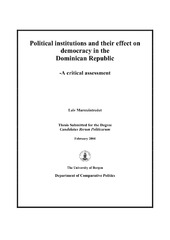| dc.description.abstract | This thesis deals with political institutions and their effect on democracy and prospects for stabilising and consolidating democracy. It discusses a single case: The Dominican Republic. The new institutional theories argue that political institutions affect democracy, democratic stability and prospects for democratic consolidation. The thesis argues that new institutional theories do not sufficiently discuss their dependent variable: Democracy, democratic stability or consolidated democracy. This has affected the relationship found between political institutions and the dependent variables, and is one principal reason why the new institutionalists disagree upon how political institutions affect the dependent variables. Therefore, after evaluating former regime classifications of the Dominican Republic, this thesis provides a thorough analysis of the Dominican political regime 1966-2002. This is done by the help of a new conceptualisation of democracy, based on radial concepts. This new conceptualisation distinguishes well between different types of what has formerly been defined only as semi-democratic regimes. The thesis specifically focuses on the area of horizontal accountability, which it is argued, should constitute a part of the concept democracy. The thesis also compares the new institutional theories with respect to what is considered to be most important factor for democratic instability: Deadlocks. The thesis argues that the new institutional theories have failed operationalise the dependent variable deadlock. This thesis suggests a new operationalisation of deadlocks and investigates which of the new institutional theories best predict deadlocks. The data material show, with one exception, few differences between the predictive powers of the new institutional theories on deadlocks. The thesis also investigates the consequences of institutional deadlocks, and finds that these have not led to any regime breakdowns in the Dominican Republic 1978-02. However, one finding is that deadlocks lead to an increased presidential dominance and an increased lack of horizontal accountability. Finally, the thesis investigates the political institutions’ effect on prospects for consolidation of the Dominican regime. The thesis concludes that the political institutions in the Dominican Republic did not favour a consolidation of the regime after 1978. It also concludes that the Dominican Republic is not a full democracy today or consolidated, but, with some reservations, a stable delegative democracy. | en_US |
